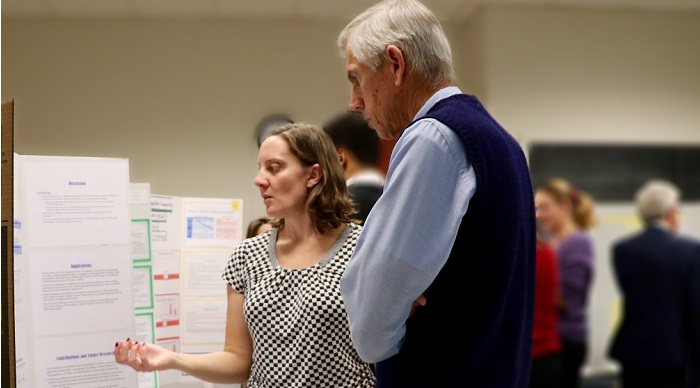School of Education
Doctoral students present analyses of mathematics curriculum

Doctoral students in the School of Education completed the semester with an exciting poster presentation of their course projects for “EDUC 835: Research and theory of mathematics education” with Amanda Jansen, associate professor of mathematics education. The poster session, held December 7 in Willard Hall Education Building, showcased the work of Ph.D. students Joe DiNapoli, Tony Mixell, Bernie Parisi, Jen Hummer, Laura Willoughby and Ed.D. students Sudha Aravindan and Hrysoula Davis.
Over the course of the semester, the doctoral students worked to analyze mathematics curriculum materials and consider the degree to which they supported student learning and engagement with the discipline of mathematics. For example, one of the students analyzed elementary school materials and considered whether they afforded children the opportunity to learn early algebra. Other students studied high school or elementary materials and asked whether they engaged students in higher-level reasoning from various perspectives. Some projects also addressed student engagement, such as the degree to which curriculum materials and related tasks supported perseverance, interest in the discipline, and participation in substantive classroom discourse.
“Analyses of curriculum materials can only reveal opportunities for students, since how teachers and students use the materials ultimately shapes the opportunities students have with the texts,” said Jansen. “However, these analyses can reveal implicit messages and opportunities that even the authors of the materials may not have considered.”
“I investigated how high school mathematics texts provide opportunities for student perseverance,” said DiNapoli. “The textbook analysis project was rewarding in that it opened my eyes to the utility of curricular analyses.”
This assignment differed from other course-based research projects in its ability to offer doctoral students an immersive, semester-long opportunity for qualitative, quantitative, or mixed-methods data analysis. Jansen designed the project with data analysis in mind, asking her students to work only with existing curriculum materials and prioritizing the analysis of results. Often, research projects conducted within the context of a course center on the research project design and data collection. Due to limited time, such projects do not often allow students to fully analyze their data.
In contrast, Jansen’s assignment gave her students an opportunity for detailed data analysis, including the creation of a conceptual and analytic framework using both an inductive (informed by the data) and deductive process (informed by theory and prior research). Her students grappled with the difference between coding data and analyzing the coded data, as well as how to craft a storyline for readers based on what they learned about their coded data.
The assignment also asked doctoral students to engage in constructive conversation and a revision process that considered feedback from the SOE community. Prior to the poster session, students completed a rough draft of their study and received feedback from Jansen and a peer. After sharing their poster with the class during its final session, the students “went public” and shared their work with the SOE community. Faculty from the SOE and the Department of Mathematical Sciences attended the evening poster session and offered the students additional feedback. After one final round of revisions, students then submitted their final projects.
“My course project investigated how two widely used Common Core geometry textbooks provide opportunities for reasoning-and-proving and a high level of cognitive demand. Proofs are very important for mathematicians, and it’s important for mathematics educators to understand how we can support students in learning how to write proofs,” said Hummer. “I really enjoyed this study, because I learned more about a critical topic in my field and how to conduct a valuable type of curriculum analysis.”
“It’s my hope that the doctoral students feel a personal sense of pride on a job well done. They achieved an ambitious goal that I challenged them to attain: develop a conceptual framework, conduct an artifact analysis, and go public with findings,” said Jansen. “Completing an entire study in one semester is something that researchers do not tend to have time to do, so the doctoral students’ progress, in both the quality and quantity of the work, on an authentic task is impressive.”
Interested students may find more information on the Ph.D. in Education program here and the Ed.D. in Educational Leadership here.
Article by Jessica Henderson.
Photos by Alison Burris.



